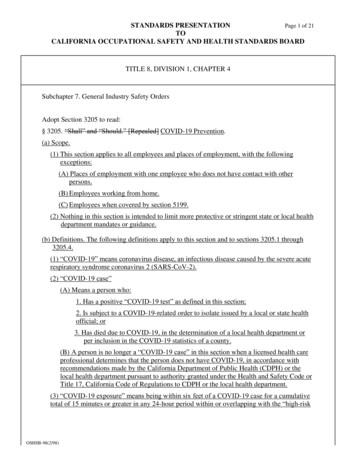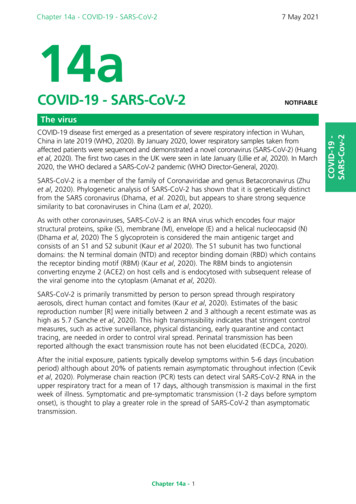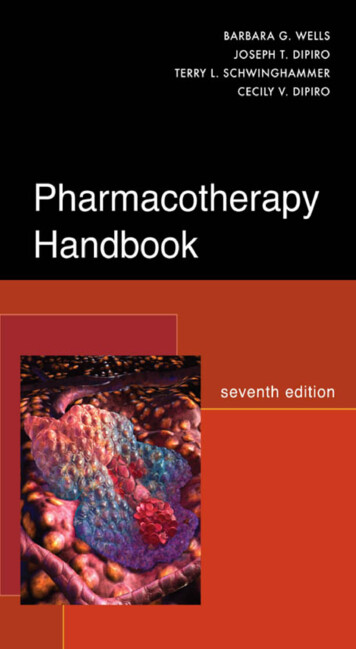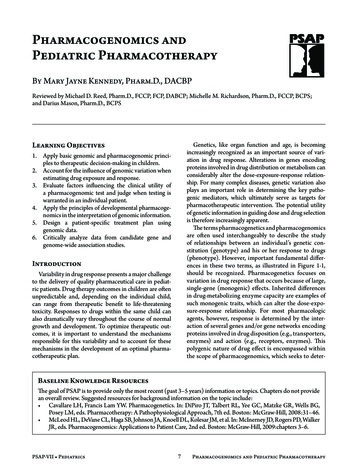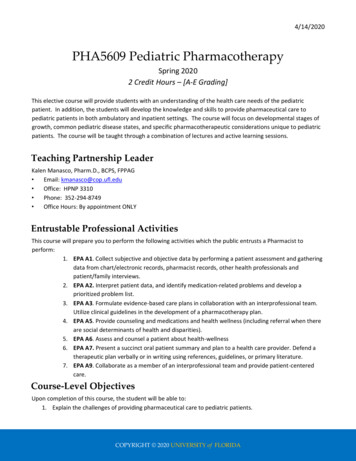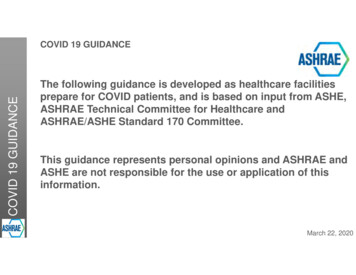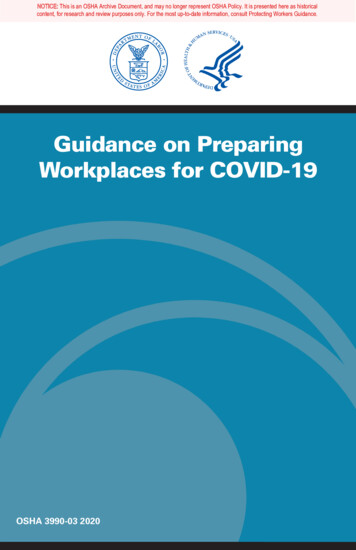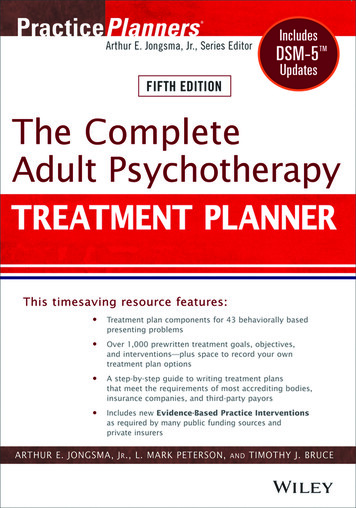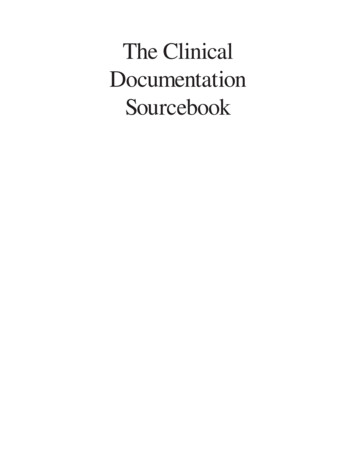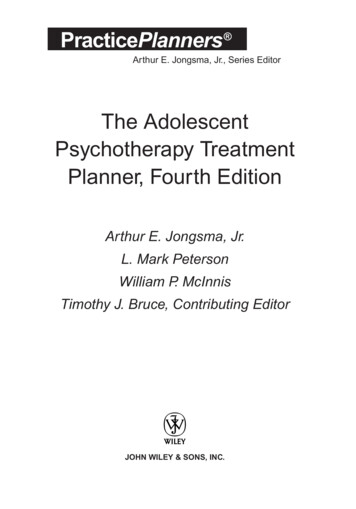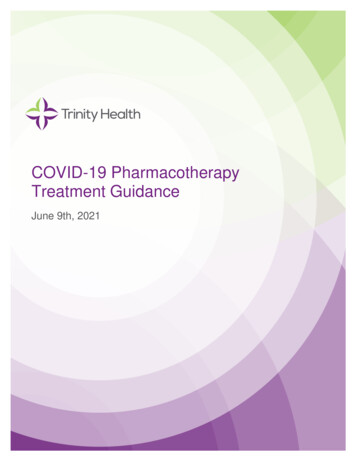
Transcription
COVID-19 PharmacotherapyTreatment GuidanceJune 9th, 2021
What’s Changed this Version: June 9, 2021Updated Casirivimab and Imdevimab dose and route options. Updated recommendation for Immunomodulators in severe disease: eitherTocilizumab or Baricitinib in addition to corticosteroids for patients not requiring mechanical ventilation. 2019 Trinity Health, All Rights Reserved1
Therapeutics . 3Monoclonal Antibody Therapy Patient Selection, Dosing, and Monitoring . 4Monoclonal Antibody Contraindications and Precautions: . 4Monoclonal Antibody Nursing Considerations . 5Monoclonal Antibody Dosing Tables and Patient Fact Sheets . 5Remdesivir Patient Selection, Dosing, and Monitoring . 5Remdesivir Contraindications and Precautions: . 6Remdesivir Dosing Table . 6Remdesivir Monitoring . 6Remdesivir Nursing Considerations . 7Remdesivir Adverse reactions. 7Remdesivir Drug Interactions . 7Convalescent Plasma . 7Convalescent Plasma: Patient Selection . 7Convalescent Plasma: Ordering and Consent . 8Convalescent Plasma: Product Qualifications . 8Convalescent Plasma: Suggested Dosing And Administration . 8Convalescent Plasma: Documentation, Adverse reactions, and Risks . 8Corticosteroids . 8Interleukin-6 (IL-6) Inhibitors . 9IL-6 Contraindications: . 9IL-6 Inhibitor Dosing . 10IL-6 Inhibitor Adverse reactions . 10IL-6 Inhibitor Monitoring . 10IL-6 Inhibitor Nursing Considerations . 10Janus kinase (JAK) inhibitor/Baricitinib . 11Baricitinib: Patient Selection . 11Baricitinib Contraindications and Precautions: . 11Baricitinib Dosing . 11Baricitinib Monitoring, Adverse Reactions, and Drug Interactions . 11Hydroxychloroquine . 12Azithromycin . 12Protease Inhibitors . 12Ivermectin . 13ACE Inhibitors and ARBs . 13NSAIDS. 13COVID And Co-Infection . 13Management of Influenza Co-Infection . 13Respiratory Treatments. 13Patient positioning . 14Use of Neuromuscular Blocker Agents and Conservation . 14Use of NMBA for COVID Recommendations: . 14Anticoagulation and COVID Related Coagulopathy Guidance . 15Anticoagulation Admission Considerations for Highly Suspected or Confirmed COVID . 15Prevention of Venous Thromboembolism (VTE) in Highly Suspected or Confirmed COVID Patients . 16Figure 1: VTE Prophylaxis . 16Empiric Therapeutic Anticoagulation for COVID related Coagulopathy . 16Empiric Thrombolytic Therapy . 16Treatment of Venous Thromboembolism (VTE) in Highly Suspected or Confirmed COVID Patients . 17Figure 2 : Therapeutic Anticoagulation for Treatment of VTE in COVID Patients . 17Thromboprophylaxis and Anticoagulation Nursing Considerations . 17Anticoagulation Discharge Considerations . 17Post Hospitalization Considerations for Patients Treated With Therapeutic Anticoagulation for Suspected or Confirmed VTE DuringCOVID Admission . 17Post Hospitalization Considerations - VTE Prophylaxis . 17References: . 21Version History . 24 2019 Trinity Health, All Rights Reserved2
OVERVIEWThere are many ongoing clinical trials and data is emerging frequently. Use of investigational anti-COVID-19 therapeutics shouldbe done under approved, randomized, controlled trials whenever feasible.THERAPEUTICSThis information is provided to share information to help guide treatment conversations. State mandates, medicationavailability/shortages, and access to Infectious Disease resources may impact some of these recommendations at given sites.As additional information becomes available, this information will be updated accordingly. Prophylaxis: Evidence does not support use of Hydroxychloroquine, or any other agent, for prophylaxis against COVID-19 Treatment: Assessment of Evidence for COVID-19-Related Treatments, updated regularly, is available in the IDSA COVID-19Guidelines, NIH COVID Treatment Guidelines and within the ASHP COVID resource center: ASHP COVID Evidence AssessmentPatient SubsetTherapeuticsOUTPATIENTMild-Moderate DiseaseOutpatient with confirmed COVID-19Clinical observation &supportive careINPATIENT NON-SEVERE DISEASEHospitalized with confirmed orsuspected COVID-19 without anysevere disease criteriaINPATIENT SEVERE DISEASE – NOTINTUBATEDConfirmed or suspected COVID pluseither of the following:a. Oxygen saturation (SpO2) 94%on room airb. Requiring supplemental oxygen AND, CONSIDER Monoclonal AntibodyFor High-Risk Patients(see comments)Clinical observation &supportive care AND, CONSIDER Remdesivir for 1- 5 days(see comments)Supportive Care AND For patients requiringsupplemental oxygen:Dexamethasone 6 mgPO/IV Daily X 10 days* AND Remdesivir for 1- 5 days(see comments) AND, CONSIDER Immunomodulator(IL-6 Inhibitor or Baricitinib)For patients with impairedimmunity: CONSIDER Convalescent Plasma,if available(see comments)INPATIENT SEVERE DISEASE –INTUBATED/ECMOConfirmed or suspected COVID pluseither of the following:a. Requiring mechanical ventilationb. Requiring extracorporealmembrane oxygenation (ECMO) 2019 Trinity Health, All Rights ReservedSupportive Care AND Dexamethasone 6 mgPO/IV Daily X 10 days* AND, CONSIDER IL-6 InhibitorCommentsMonoclonal Antibody Comments See full Monoclonal Antibody section below for patient criteria,product selection, dose, contraindications, adverse effects andmonitoringRemdesivir Comments Consider for patients with at high risk of disease progression Duration of 5 days or until hospital discharge, whichever comes first See full Remdesivir section below for dose, contraindications,adverse effects, monitoring and drug interactions*Corticosteroid Comments Duration of 10 days or until hospital discharge If dexamethasone is unavailable, equivalent doses of an alternativeglucocorticoid may be used (see corticosteroid section)Remdesivir Comments Treatment with remdesivir earlier in the course of disease has beenassociated with better outcomes compared to initiati
pediatric patients with positive results of direct SARS-CoV-2 viral testing who are 12 years of age and older weighing at least 40 kg, and who are at high risk for progressing to severe disease and/or hospitalization. o Prior to treatment the parent/caregiver should be educated with the information within, and provided with,
